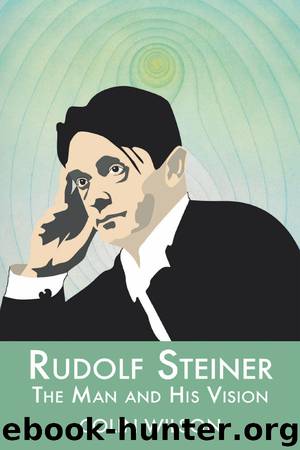Rudolf Steiner by Wilson Colin

Author:Wilson, Colin [Wilson, Colin]
Language: eng
Format: epub, azw3
Publisher: Aeon Books
Published: 2019-02-20T16:00:00+00:00
* * *
* Rudolf Steiner Enters My Life , p. 71.
* Chapter XI.
* Marie Steiner-von Sivers , by Marie Savitch.
Six
Occultist and Guru
THE rise of the Steiner movement in Europe between 1900 and 1910 was one of the most remarkable cultural phenomena of our time. It raises certain basic questions that must be examined before we proceed any further.
James Webb put the problem in a nutshell when he wrote: ‘[Steiner's] transition from liberal academic to mystical lecturer is at first sight baffling.’ He goes on to explain that Steiner's work on Goethe had prepared the ground for his theosophical convictions. We have already seen that this is untrue; the gap between the Goethe scholar and the author of Cosmic Memory is so vast as to be unbridgeable in normal intellectual terms.
Steiner's enemies had an uncharitable but plausible explanation: that Steiner seized the opportunity presented to him by a gullible group of Theosophists to create a new ‘religion’ that would appeal to his contemporaries. Steiner's followers reply that, on the contrary, his convictions all sprang from inner experience, and that most of them had already formed before he became a Theosophist. Let us try to study both sides of the argument impartially.
The anti-Steiner case runs as follows. Before he began lecturing to the Theosophists, Steiner was known as a liberal academic who was opposed to the total materialism of Haeckel. Yet his views were so confused that he wrote a book defending Haeckel. In these same years—towards the turn of the century—he made many hostile remarks about Christianity. Yet by the autumn of 1901 he was lecturing to the Theosophists on ‘Christianity as Mystical Fact’, and apparently accepting Madame Blavatsky's cosmology of the ‘seven root races’ and the existence of Atlantis and Lemuria. As time went by, Steiner expanded his view of Christianity until it became the central event in human history; as a result he acquired a large following of Protestant clergymen. Towards the end of his life, he had actually created his own branch of the Protestant Church, the ‘Christian Community’.
It must be admitted that there is a certain amount of supporting evidence for the ‘opportunist’ view. In the Autobiography, Steiner states that ‘a conscious knowledge of true Christianity’ began to dawn in him in the Berlin period, and that it grew deeper towards the turn of the century, culminating in a revelation when he stood ‘in the spiritual presence of the Mystery of Golgotha in a most profound and solemn festival of knowledge’. According to the later Steiner, the ‘Christ event’ was the central event in human history. What happened, he said, was that a divine being, who had been preparing for incarnation since the beginning of human evolution, descended to earth in the last three years of the life of the historical Jesus and took over his body. His purpose was to turn the tide of battle against the forces of materialism (aided by ‘evil’ powers called Ahriman and Lucifer), which would otherwise have overwhelmed humankind. Further complications
Download
This site does not store any files on its server. We only index and link to content provided by other sites. Please contact the content providers to delete copyright contents if any and email us, we'll remove relevant links or contents immediately.
| Ancient & Controversial Knowledge | Ghosts & Hauntings |
| Hermetism & Rosicrucianism | Magic Studies |
| Occultism | Parapsychology |
| Supernatural | UFOs |
| Unexplained Mysteries |
Animal Frequency by Melissa Alvarez(4443)
Sigil Witchery by Laura Tempest Zakroff(4229)
Real Magic by Dean Radin PhD(4113)
Fingerprints of the Gods by Graham Hancock(3979)
Aleister Crowley: The Biography by Tobias Churton(3621)
Journeys Out of the Body by Robert Monroe(3603)
The Rosicrucians by Christopher McIntosh(3503)
Alchemy and Alchemists by C. J. S. Thompson(3501)
Mysteries by Colin Wilson(3435)
Hitler's Monsters by Eric Kurlander(3317)
The Hatha Yoga Pradipika (Translated) by Svatmarama(3310)
Wicca: a guide for the solitary practitioner by Scott Cunningham(3157)
John Dee and the Empire of Angels by Jason Louv(3154)
Infinite Energy Technologies by Finley Eversole(2963)
Book of Life by Deborah Harkness(2913)
Dark Star Rising by Gary Lachman(2853)
The Book of Lies by Aleister Crowley(2827)
Aliens by Jim Al-Khalili(2814)
To Light a Sacred Flame by Silver RavenWolf(2801)
